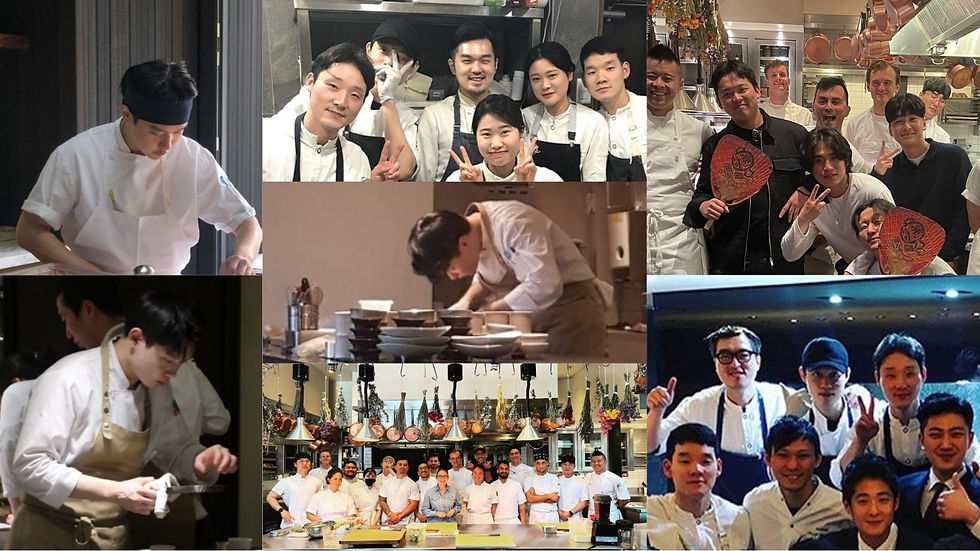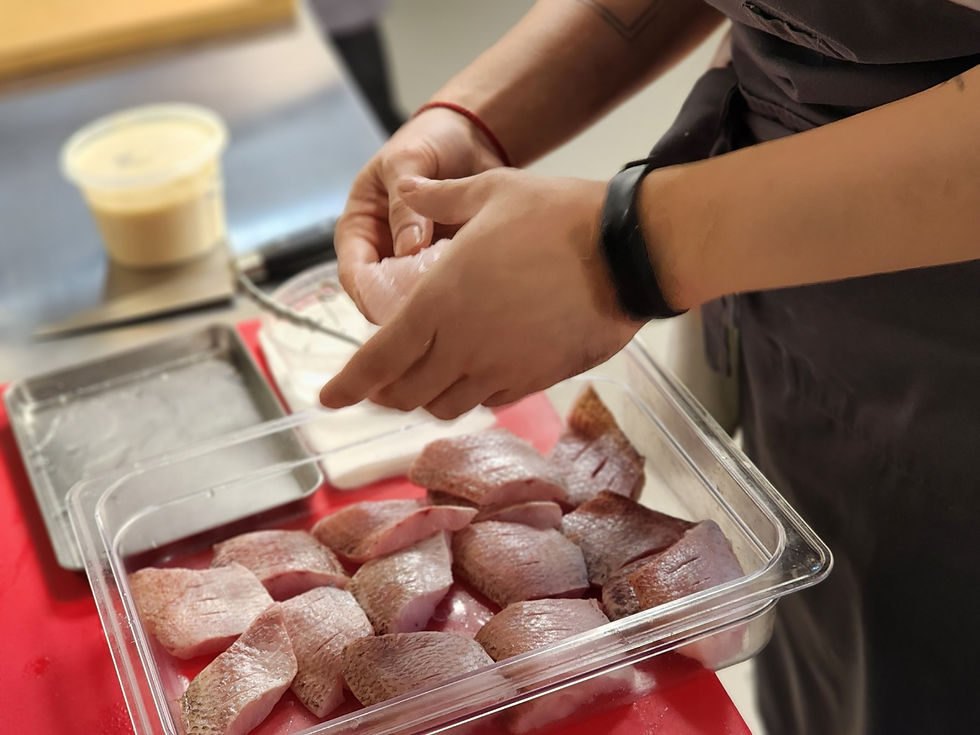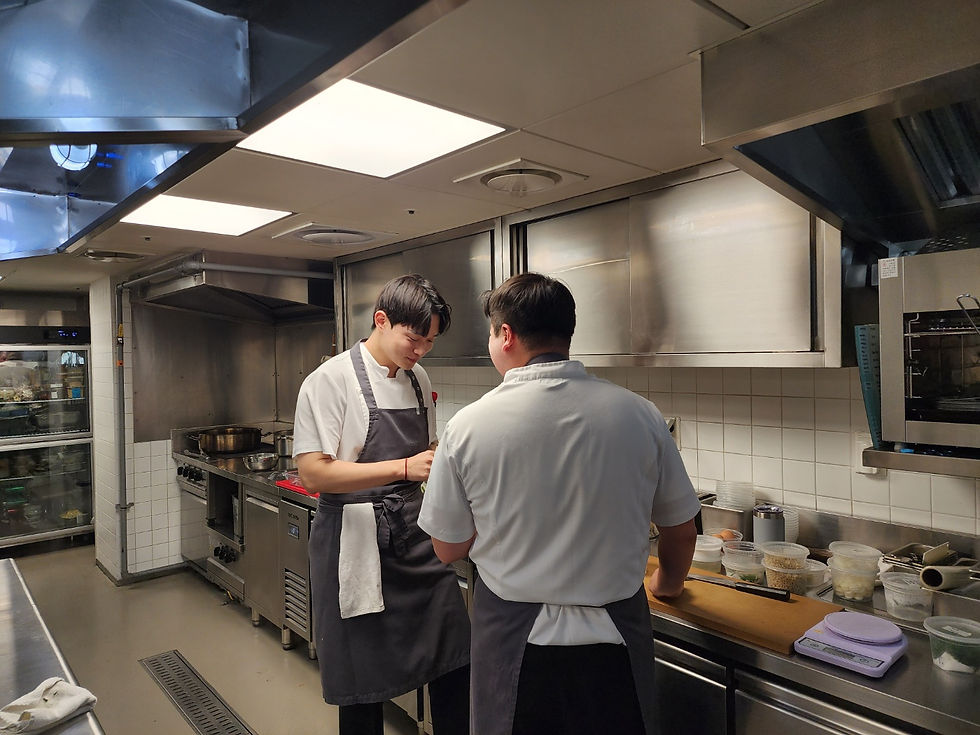Sous-chef: Jinsoo Lee
- solbam
- 2025년 8월 18일
- 5분 분량
최종 수정일: 2025년 9월 19일
Sous Chef Jinsoo Lee continues to steadfastly lead the kitchen at Solbam, striving each day to create food that brings a smile to those who taste it.

How did you first begin your journey in cooking?
When I was in middle school, one of my teachers noticed that I had good dexterity and suggested I try baking and pastry. That was the beginning. I started learning pastry, but soon found myself more drawn to cooking, and eventually chose that as my path.
I majored in culinary arts in university. At first, I was very interested in Western cuisine, so I worked part-time in many different places whenever I had the chance—pasta houses, casual restaurants, anywhere I could gain experience during semesters and breaks.
Then, in my senior year, I heard that the Michelin Guide was launching in Seoul. I still vividly remember watching the star revelation ceremony with excitement. I thought it would be nearly impossible to even make a reservation at those restaurants once they were awarded. Seeing that Michelin-starred restaurants were opening in Korea sparked a strong desire in me to work in one. After that, I gained experience in Michelin-starred restaurants both in Korea and the U.S. before eventually joining Solbam.

What were some of the key lessons you learned along the way?
Working in different kitchens gave me a broad perspective on both technical skills and mindset as a chef. At my first job, I learned Western techniques as well as methods of handling ingredients inspired by Japanese cuisine. At my second job in the U.S., I picked up a lot of modern recipes and contemporary techniques—it was one of the hottest kitchens at the time.
I also learned the importance of small courtesies and how to function within a team. When I went to the U.S., I experienced a completely different kitchen culture. The kitchens were larger, more systematic, and that scale itself was inspiring. One of the most striking lessons came at Saison, where the chef would visit the market early every morning to source ingredients himself. He would buy, say, tomatoes in the morning, then have the team taste them and ask how we thought they should be cooked. That practice of dialogue and collaboration, rooted in the chef’s own experience, gave me a new perspective on how ingredients should be respected and how teams could work together.

You’ve been with Solbam for two years now. What has changed for you?
It’s been nearly two years since I joined Solbam. At the beginning, I focused mainly on absorbing and learning as much as I could. Now, my focus is more on creating growth together with the team.
Through Chef Um Taejun’s feedback and working closely with my colleagues, I’ve been part of building a culture together. Along the way, I’ve grown naturally myself. As I continue working, I often find myself discovering new aspects of who I am as a chef. I’ve also been much more involved in menu development, and I now carry a greater sense of responsibility—not just as someone who learns, but as a member helping to shape Solbam’s culture.
What do you consider most important in your role as sous chef?
Before Solbam, I thought a leader’s role was simply to “pull the team along.” But here, I learned that a leader isn’t just someone who sets the direction, but someone who builds a better culture and helps the whole team grow together.
My priorities have changed a lot too. I used to think that as long as someone was talented, personality didn’t matter. Now, I know that how you treat people—your character and leadership—matters just as much as skill. A restaurant is, after all, a place where people work together long-term.
Another thing I’ve realized is that feedback doesn’t just flow from leader to team. When team members give feedback to the leader, it can often help the whole group grow. Even when our opinions differ, I try to keep an open mind, listen, and sometimes reassess my own direction. That has matured my leadership as well.

What does an ideal kitchen team look like to you?
In the past, I believed that a tough, pressurized environment was the best way. Even shouting or harsh words seemed excusable under the name of “passion.” But now I see it differently: a team with both passion and respect is the one that grows healthier and stronger.
When everyone can comfortably showcase their skills, the energy from each person blends together and creates a much better dish. Respecting one another, cultivating good habits, and always being willing to step forward first—that, to me, is the image of an ideal kitchen. And at Solbam, I get to witness and learn from that every day.
How would you describe Solbam’s leadership structure?
Chef Um sets the direction, and then the team branches out to reinforce and build on it. If Chef Um is the captain of the ship, then each of us plays a role in ensuring the ship sails correctly. A captain holding the wheel alone cannot move the vessel; it takes everyone, in every part of the kitchen, taking responsibility for their role to make sure we move forward together.
What do you think is the most important virtue for a chef?
Anyone can make mistakes—but what matters is how quickly you can resolve them. It’s about how you manage your mindset, how you take something that’s gone wrong and bring it back to the right state. At Solbam, the word “compromise” doesn’t exist. Sometimes, this means discarding an entire batch of sauce right before service. There are always variables, but the key is maintaining composure and focusing on how to restore things quickly and calmly.

What challenges have you overcome?
Looking back, the hardest challenges weren’t about cooking, but about people. No two people will ever match perfectly. In the past, I often tried to enforce my perspective using my position. At Solbam, though, I’ve learned—by watching Chef Um and my colleagues—that communication is the real way to solve problems. That’s also what helps a restaurant grow.
In menu development as well, Chef Um sets the overarching direction, and we work together to research, exchange ideas, and bring the concepts to life.

Can you tell us about Solbam’s R&D Kitchen?
Solbam has a “Research Kitchen,” and the sous chefs take turns leading it. Starting next season, I’ll be in charge. Recently, we traveled to Andong for research. Two sous chefs and our pastry chef each selected sites through research, then we visited, shared insights, and wrote reports.
The starting point is always ingredients. We study seasonal and regional Korean ingredients, and archive that data. Building this database allows us to keep developing stronger menus in the years ahead. At first, Solbam didn’t have much of a system, but now, as we approach our fifth year, I believe that data and groundwork are essential for preparing the future.
For instance, we discovered hapjajang (a mussel extract) in Tongyeong and adapted it into our menu in our own way. In Andong, we visited a producer of Jebiwon soy sauce, made from local beans, and were inspired by its deep, earthy flavor. Seeing it brewed in the mountains, in clean air, gave me a new sense of respect for such traditional methods and the flavors they create.


You’ve also gained experience through international collaborations.
Collaborating with overseas restaurants always pulls me out of the “frog in the well” mindset. It’s easy to think the way we do things is best, but seeing other kitchens, other cuisines, and other cooking methods broadens my perspective. It influences our menus, widens our output, and sparks new creativity.
These collaborations also help me form global connections beyond Korea. Becoming colleagues through work, learning from each other—that’s been an invaluable asset.
What are your plans for the near future?
Right now, my focus is on the immediate goals. I’ve come to appreciate days without unexpected crises or disruptions. To finish the next four months smoothly, without trouble—that’s my goal for this year. I’ve realized that sometimes, the best day is the one when everything simply flows without issue.



댓글